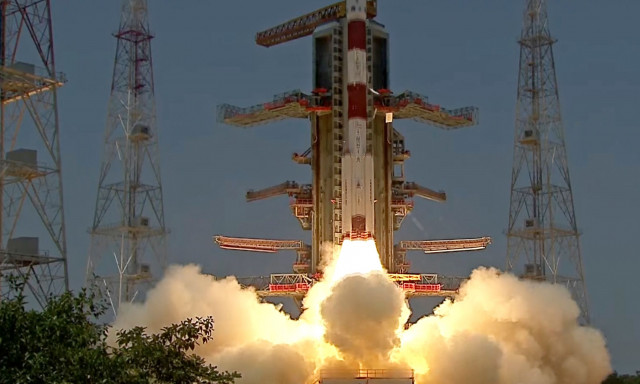India's Quantum Satellite Quest and Supremacy
India's quantum satellite initiative aligns perfectly with global efforts to counter cyber threats

India's ambitious plan to launch a quantum satellite within the next three years marks a significant milestone in global secure communications. With a substantial investment of ₹6,003.65 crore through the National Quantum Mission (NQM), India is positioning itself not only as a technological leader but also as a key contributor to international security infrastructure.
The quantum satellite program, spearheaded under Ajai Chowdhry's leadership, promises to revolutionize secure communications for India and its international allies. This initiative becomes particularly significant as traditional encryption methods face increasing vulnerability to quantum computing threats. For India's strategic partners, including the United States, Japan, Australia, and European nations, this development offers new opportunities for secure diplomatic and defense communications.
The program's foundation rests on groundbreaking research at the Indian Astronomical Observatory in Hanle, Ladakh. Here, researchers have achieved superior signal transmission metrics, with losses of just 44 dB – setting new benchmarks for quantum communication efficiency. This advancement benefits not only India but also creates opportunities for technological collaboration with allied nations.
Quantum Key Distribution (QKD) technology, the cornerstone of this initiative, offers unprecedented security levels by leveraging quantum physics principles. This capability is crucial for protecting sensitive international communications, trade secrets, and diplomatic exchanges between India and its partners. The system's ability to detect eavesdropping attempts instantaneously makes it invaluable for maintaining the confidentiality of multi-national military operations and strategic partnerships.
The program's international scope is ambitious, aiming to enable secure quantum communication across 2,000 kilometers. This range makes it possible to establish secure channels with neighboring friendly nations, strengthening regional security cooperation. For countries in the Indo-Pacific region, India's quantum satellite network could provide a secure alternative to existing communication systems, reducing dependence on potentially compromised networks.
India's quantum satellite initiative aligns perfectly with global efforts to counter cyber threats. By developing this technology, India strengthens the collective security infrastructure of democratic nations. The program complements similar initiatives by allied nations, creating possibilities for an interoperable, global quantum communication network that could secure international diplomatic, military, and economic communications.
The integration of quantum satellites with artificial intelligence opens new avenues for international collaboration. From secure international financial transactions to protected healthcare data exchange, the applications benefit both India and its partners. This technological convergence could accelerate joint research initiatives in pharmaceuticals, climate science, and defense technology among allied nations.
The NQM's comprehensive approach, encompassing computing, communication, measurement, and sensing, creates multiple opportunities for international cooperation. Allied nations can participate in knowledge exchange, joint research, and development of complementary technologies, strengthening global technological partnerships.
The proposed constellation of 4-7 satellites could form part of a larger international quantum communication network. This infrastructure could serve as a backbone for secure communication among friendly nations, particularly crucial in times of global crisis or conflict. The involvement of both ISRO and private sector players opens doors for international space technology partnerships.
For India's allies, particularly those in the Quad alliance (US, Japan, and Australia), this quantum communication capability offers strategic advantages. It provides a secure channel for sharing sensitive intelligence, coordinating military operations, and maintaining diplomatic communications safe from potential adversaries. The technology could be particularly valuable for securing communications in contested regions and during joint military exercises.
India's quantum satellite initiative emerges as a strategic counterweight to China's quantum advancements in space. While China currently operates three quantum satellites and four ground stations in the world's largest QKD network, India's developing quantum capabilities aim to secure communications across the Indo-Pacific region. This technology will strengthen India's ability to detect Chinese surveillance and prevent unauthorized access to sensitive military and diplomatic communications. The quantum satellite program, once operational, will provide India and its allies with communication channels that are theoretically immune to Chinese interception or decryption attempts, even with advanced quantum computers.
This becomes particularly crucial in border regions and contested territories where secure communication is vital for military operations. India's quantum network could also protect critical infrastructure and sensitive data from Chinese cyber threats, helping safeguard national interests while developing indigenous technological capabilities that reduce dependence on Chinese telecommunications infrastructure. The initiative aligns with broader international efforts to create quantum communication networks independent of Chinese influence, ensuring secure diplomatic and strategic communications among democratic nations in the region.
The timing of India's quantum satellite initiative coincides with growing global concern over cybersecurity threats. As quantum computing capabilities advance worldwide, India's development of quantum-secure communication networks positions it as a valuable partner in the global effort to maintain digital security. This initiative strengthens India's role in international security architectures while providing allies with access to cutting-edge secure communication technology.
The program also opens new avenues for economic cooperation. Allied nations can participate in the development and deployment of quantum communication technologies, creating opportunities for joint ventures and technology transfers. This technological collaboration could extend to other areas of quantum computing and sensing, fostering deeper economic ties between partner nations.
Through this pioneering initiative, India is not just securing its own communications infrastructure but is contributing to global technological advancement. The quantum satellite program represents a crucial step toward creating a secure, interconnected world where allied nations can communicate without fear of interception or breach. As quantum technology continues to evolve, India's leadership in this field positions it as a key partner in shaping the future of global secure communications.
























